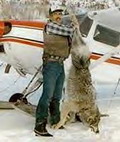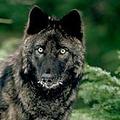 由四個保育團體對阿拉斯加州狼群管制計畫提出的訴訟產生了結果,聯邦法官於15日宣布禁止在該州幾個地區對狼群進行空中獵殺。在此同時,最高法院法官摩斯(William Morse)支持由飛機或是直昇機上射殺狼群的管制計畫。
由四個保育團體對阿拉斯加州狼群管制計畫提出的訴訟產生了結果,聯邦法官於15日宣布禁止在該州幾個地區對狼群進行空中獵殺。在此同時,最高法院法官摩斯(William Morse)支持由飛機或是直昇機上射殺狼群的管制計畫。
2006年動物管理小組將空中射殺的範圍擴大後,幾個保育團體,包括動物之友(Friends of Animals)、野生動物守護者(Defenders of wildlife)、阿拉斯加野生動物聯盟與山巒俱樂部(Sierra Club)對阿拉斯加州政府漁業與動物部以及動物管理小組提出了訴訟。
在訴訟過程中,法官摩斯檢驗了阿拉斯加狼群管制計畫的始末,最後他判決空中狼群射殺的合法性,但在總計六萬平方英里的面積中,他封殺了其中一萬五千平方英里的射殺計畫。法官封殺的地區為動物管理小組在2006年擴大的射殺計畫區域,其中包含了在透克(Tok)附近的「四十哩麋鹿」以及安克拉治附近的庫克灣。
據阿拉斯加漁業與動物部估計,州內總共有7700-11200匹狼,野生動物管理員表示,因為狼群大量補殺麋鹿,空中射殺狼群計畫可以有效保持麋鹿數量以供獵人生存。
但保育團體則持相反看法,他們堅持動物管理小組所持的科學數據不足以支持從2003年以來獵殺的700餘匹狼。動物之友會會長法羅(Priscilla Feral)在康州的辦公室說道:「我們的目的在於阻止州政府在2006年擴大的四個射殺地區,總計1萬2千-1萬5千平方哩。在州政府一心想要擴大狼群獵殺的計畫之下,他們一共開放了6萬平方哩的空中獵殺區。」
阿拉斯加選民在2008年8月將再次對空中狼群獵殺計畫投下公投票。
在華府的眾議院民主黨人士於2007年9月提案保護狼、熊等野生動物免於被空中獵殺。這個「保護美國野生動物法案」(Protect America’s Wildlife Act,又稱PAW Act)是由加州眾議員米勒(George Miller)、原先「空中獵捕法案」(Airborne Hunting Act)的管理人密西根州眾議員丁吉(John Dingell)以及擔任內政款項委員會主習的華盛頓州眾議員克斯(Norm Dicks)等三人聯手提案。
 這個編號H.R.3663,目前正在自然資源委員會審查的議案將會彌補聯邦法律的漏洞,禁止阿拉斯加州允許獵人從飛行器上獵殺狼群。
這個編號H.R.3663,目前正在自然資源委員會審查的議案將會彌補聯邦法律的漏洞,禁止阿拉斯加州允許獵人從飛行器上獵殺狼群。
議員米勒說:「現在正是剷除阿拉斯加違法又違背人性的空中狼群獵殺計畫的時機。阿拉斯加實行的計畫不但違反了聯邦法,更違背了州民以及全美國民的原則。這個新的『保護美國野生動物法案』,將會避免美國的野生動物招致不人道或不平等的獵殺,它規定州政府需遵守原先的『空中獵捕法案』,州政府只能在合法的緊急事件中進行空中獵捕,而非授權其他非法獵捕行為。」
而且這個法案未更改「當土地、牲口、水源、寵物、農作物或是人類健康安全遭到危及時,」可使用飛行器捕殺動物的例外情況。
A federal judge on Friday invalidated the aerial gunning of wolves in several areas of Alaska in a case brought by four conservation groups challenging the state's wolf control program.
At the same time, Superior Court Judge William Morse upheld the practice of shooting wolves from planes and helicopters.
The program was challenged by Friends of Animals, Defenders of Wildlife, the Alaska Wildlife Alliance, and the Sierra Club, who sued the Alaska Department of Fish and Game and the Board of Game in 2006 after the Board extended the areas where aerial gunning was allowed.
In his decision, Judge Morse examined the entire history of Alaska's wolf control programs. His ruling upholds the aerial gunning program as a whole, while banning the practice in four areas covering up to 15,000 of the total of about 60,000 square miles covered by the program.
The areas where the judge banned aerial gunning are the areas into which the Game Board extended it in 2006, notably covering the entire Forty Mile caribou herd near Tok and also in an area across Cook Inlet from Anchorage.
The Alaska Department of Fish and Game estimates there are now between 7,700 and 11,200 wolves in the state. State wildlife managers say they prey too heavily on caribou and moose and that the aerial shooting program will increase the populations of these animals needed by subsistence hunters.
But the conservation groups maintain that the science on which the Game Board bases its decisions is not sufficient to justify killing more than 700 wolves since the program began in 2003. From her office in Darien, Connecticut, Priscilla Feral, president of Friends of Animals, said, "Our efforts in the lawsuit stopped aerial wolf control in 12,000 - 15,000 square miles of Alaska - that's four regions into which the state had expanded their reckless killing schemes in 2006. They've opened 60,000 square miles to aircraft and helicopter-assisted shooting as the bureaucracy is hell bent on killing wolves all across the state."
Alaska voters will again have an opportunity to weigh in on aerial wolf control when they go to the polls in August.
In Washington, House Democrats introduced legislation last September that would protect wolves, bears, and other wildlife from airborne hunting. The Protect America's Wildlife Act, or PAW Act, was introduced by California Congressman George Miller along with Congressman John Dingell of Michigan, the floor manager of the debate on the original Airborne Hunting Act; and Congressman Norm Dicks of Washington state, chair of the Interior Appropriations Subcommittee.
Now before the Committee on Natural Resources, the bill, H.R. 3663, would close a loophole in federal law that Alaska officials have used to permit hunters to shoot wolves from aircraft.
"It's time to ground Alaska's illegal and inhumane air assault on wolves," said Miller. "The state of Alaska has been operating an airborne hunting program that not only ignores federal law but violates Alaskans' and other Americans' wishes. The PAW Act will help to protect our nation's wildlife from the unethical and unfair practice of airborne hunting." The PAW Act provides that states can only conduct activities prohibited by the Airborne Hunting Act to respond to legitimate biological and other emergencies, not just to authorize otherwise-illegal hunting practices.
The bill does not alter existing exceptions for the use of aircraft for animal control where land, livestock, water, pets, crops, or human health and safety are at risk.
全文及圖片詳見:ENS





